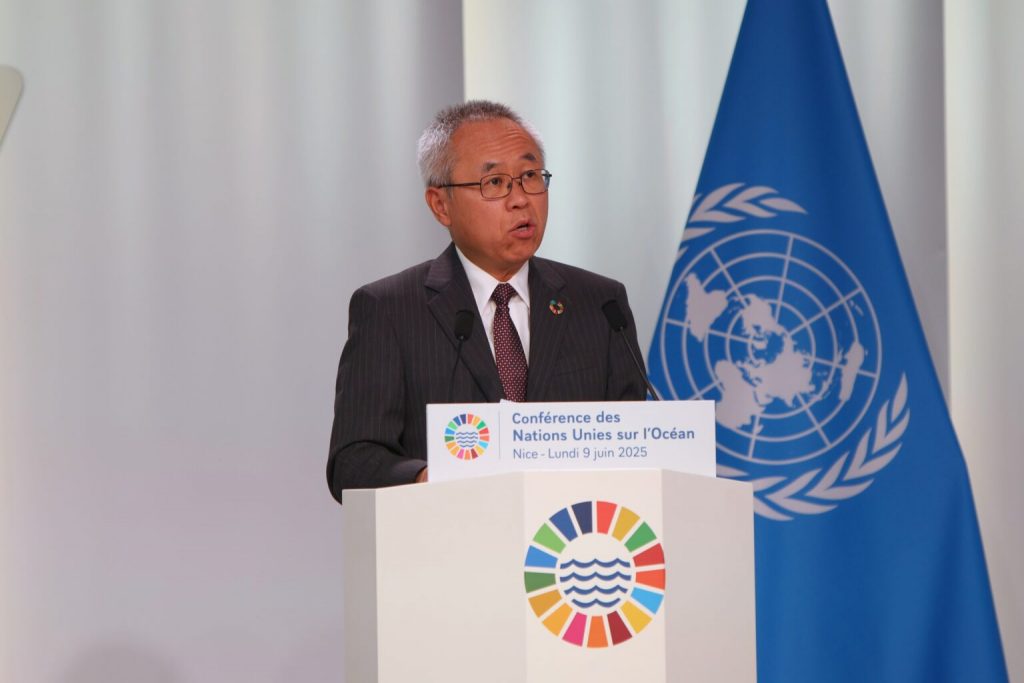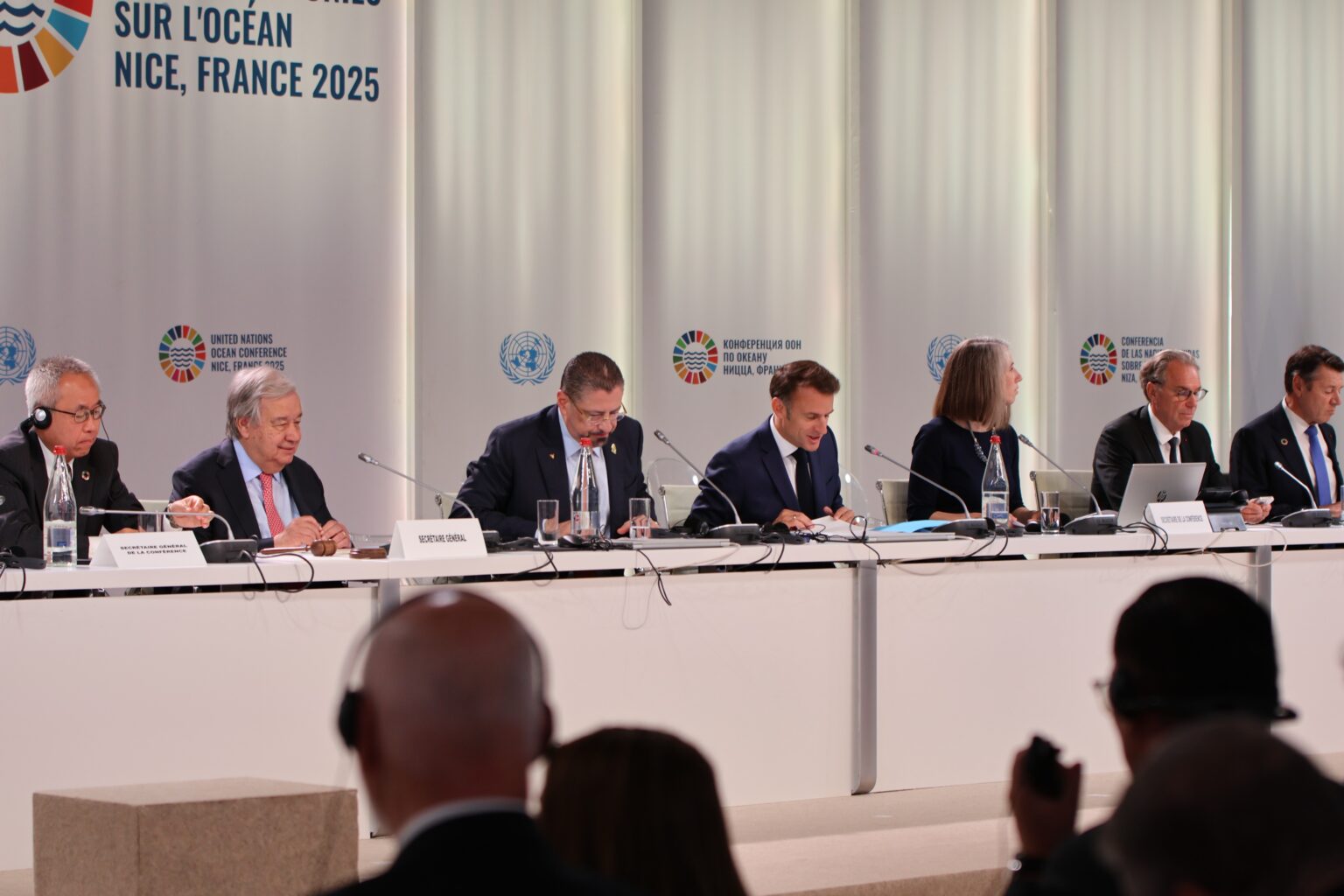By Dare Akogun
The third United Nations Ocean Conference officially opened in Nice on Monday with urgent appeals from global leaders, scientists, civil society, and Indigenous representatives to intensify efforts to preserve the ocean, the planet’s largest ecosystem and a critical regulator of global climate, food systems, and livelihoods.
Co-hosted by the Governments of France and Costa Rica, the high-level gathering marks a pivotal moment for international cooperation on marine protection, as escalating threat ranging from climate-induced marine heat waves to plastic pollution continue to push ocean ecosystems to the brink.
In his opening remarks, United Nations Secretary-General António Guterres stressed the need for “bold pledges” and swift action, warning that the time for incremental steps has passed.
“We live in an age of turmoil,” Guterres said, “but the resolve I see here gives me hope. Hope that we can turn the tide.”
President Emmanuel Macron of France called for renewed multilateralism to confront the ocean crisis, asserting that solutions must go beyond governments.
“The only way to meet this challenge is to mobilize all actors heads of state and government, but also scientists,” Macron said.
President Rodrigo Chaves Robles of Costa Rica described the summit as a moral and economic turning point, adding, “Looking after the ocean is not simply an option. It is a moral imperative and an economic necessity.”
A Nigerian Perspective: Why This Matters
For Nigeria, a nation with over 850 kilometers of coastline and millions dependent on marine and freshwater fisheries, the stakes couldn’t be higher.
Rising sea levels, overfishing, oil pollution in the Niger Delta, and plastic waste in urban waterways such as Lagos Lagoon are not just environmental concerns but also existential threats to food security, coastal livelihoods, and national economic resilience.
While Nigeria has made some progress, including its Blue Economy Policy and participation in regional marine protection frameworks, the outcomes from this UN conference particularly the Nice Ocean Action Plan and potential financial commitments could unlock fresh momentum for climate-smart fisheries, plastic pollution control, and marine conservation at home.
Urgent Themes Under Discussion
The five-day conference is expected to culminate in a political declaration and a registry of voluntary commitments known collectively as the Nice Ocean Action Plan. Central to the discussions are:
1. The Marine Biodiversity Treaty (BBNJ Agreement):
Adopted in 2023, the Agreement covers nearly two-thirds of the world’s oceans, beyond national jurisdiction. Its ratification is considered essential to achieving Sustainable Development Goal (SDG) 14, which focuses on conserving and sustainably using oceans, seas, and marine resources. A special treaty event today aims to accelerate signatories.
2. Sustainable Fisheries:
Ending illegal, unreported, and unregulated (IUU) fishing remains a priority. Experts at the conference advocate for community-led, science-based approaches to rebuild fish stocks a model highly relevant for Nigeria, where artisanal fishing communities along the Atlantic Coast are facing increasing decline due to industrial overfishing and habitat degradation.
3. Marine Protected Areas (MPAs):
Discussions focused on the Kunming-Montreal Global Biodiversity Framework, especially the 30×30 target protecting 30% of marine and coastal ecosystems by 2030. Nigeria’s marine zones could benefit from similar conservation schemes with international funding support.
4. Decarbonizing Maritime Transport:
With Africa’s maritime transport sector rapidly growing, the push to transition to low- and zero-emission fuels is a call to action for Nigeria’s seaport infrastructure in Lagos, Onne, Warri, and Calabar, among others.
Embracing port electrification could position the country as a green shipping hub in West Africa.
5. Plastic Pollution:
One of the most visible ocean threats, plastic waste is choking waterways from Makoko to Bonny Island. The conference seeks renewed political will ahead of the August 2025 global negotiations on a legally binding plastics treaty.
Nigeria, ranked among the top plastic polluters in Africa, has an opportunity to lead on domestic reforms and global advocacy.
6. Financing and Partnerships:
UN Under-Secretary-General Li Junhua, the Conference Secretary-General, emphasized that solutions require billions, not millions in investment.

“We need binding commitments that survive political transitions and economic pressures,” he said, urging donor countries and private investors to scale up support for coastal resilience, blue economies, and marine research in developing nations like Nigeria.
Science, Indigenous Knowledge, and Governance
The conference has also spotlighted the role of cutting-edge research, observation systems, and Indigenous knowledge in shaping effective ocean governance.
African coastal communities, including Nigeria’s riverine dwellers, offer centuries-old marine stewardship practices that could inform localized conservation strategies.
Looking Ahead
The Nice Ocean Action Plan, expected at the end of the conference, could serve as a new roadmap for Nigeria and other Global South nations to align national policies with global marine priorities.
For Nigerian environmental advocates, researchers, and government agencies, the conference is a reminder that the health of the ocean is the health of the people.
Coastal erosion in Lekki, oil-spill disruptions in Bayelsa, or declining fish stock in Badagry are not isolated events but part of a global crisis that requires both global action and local solutions.
With the August 2025 plastic treaty negotiations, COP30, and SB62 still ahead this year, Nigeria must seize every opportunity to build momentum for inclusive ocean governance that benefits both people and planet.

